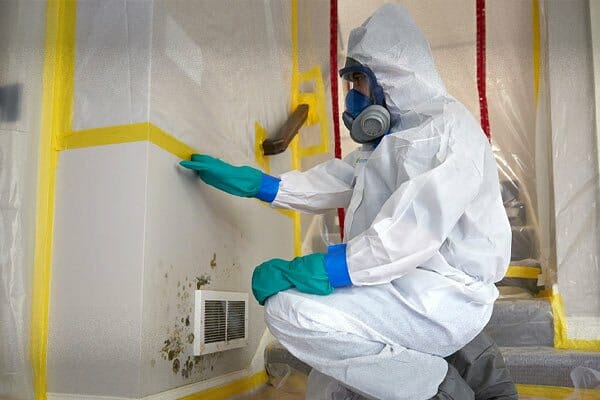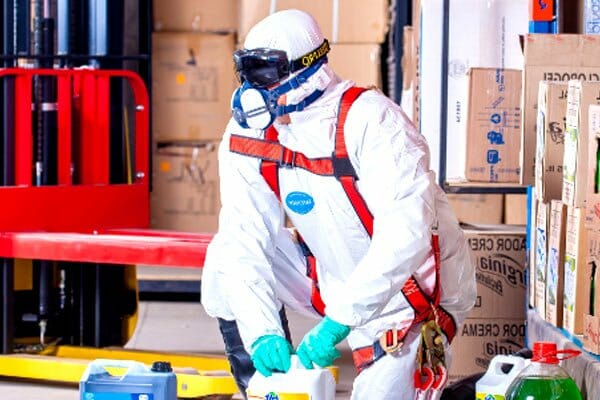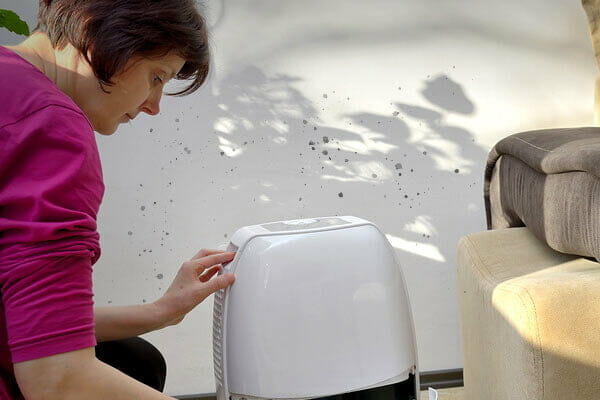Carrying out mold eradication in your home could pose risks to your health, based on the volume of mold being treated and its location.
If the area you are having remediated for mold is fairly small and contained, you will be able to stay in your home during mold remediation. If it is larger, and in a highly frequented area of your home, you may need to find temporary alternative accommodation.
Your mold remediator will be your best guide in deciding whether or not you should stay in your home during mold remediation. As a trained professional in the science of mold remediation, they will have the best understanding of your individual circumstances while the mold remediation process is ongoing.
How does mold remediation work?
Mold remediation works by containing, cleaning, and sanitizing any areas or surfaces in your home that have been affected by excessive mold growth.
Your mold remediation professional will begin by assessing the moldy area in question. Often there will be an underlying moisture or dampness issue that has caused the mold growth in the first place. The first course of action will be to fix this underlying issue to prevent the mold growth from reoccurring in the future.
Then your mold remediator will contain the mold growth to prevent the further spread of mold spores, before using specialized equipment and chemicals to clean and remove the mold growth.
The exact procedure will differ depending on where the mold is growing, and the type of surface it is growing on. Mold remediation professionals are trained in the best methods of mold cleaning and removal for various surfaces and materials.
Finally, your mold remediation specialist may need to dispose of any objects or materials in your home that have become too inundated with mold to be successfully
remediated. These unsalvageable materials, which often include carpets or sections of drywall, will be properly disposed of by your mold remediator.

Will the mold remediators use toxic chemicals?
Mold remediators use a variety of different chemicals and products, in keeping with the official guidelines from the Environmental Protection Agency (EPA). Some of these include containment sprays, bleach-based cleaning agents, biocides, and antifungal and antimicrobial products that help prevent future mold growth.
Just as many of the household cleaners you use every day can be dangerous and toxic, so too can the products that mold remediators use. However, your mold remediator is a trained professional, and is highly adept at using these products and chemicals to remove mold from your home.
In order for mold growths to be effectively and efficiently remediated, they need to first be killed. In most circumstances, mold remediators will use bleach-based cleaners and biocides to kill mold growths. This is the same process and guidance given to individuals by the EPA when they wish to remove small mold growths from their home.
If your mold remediator anticipates that your mold remediation will require a large volume of chemicals, they may advise you to move out of your home while these chemicals are being used.

How long does mold remediation take?
Just as the process of mold remediation will differ depending on the extent and location of your mold growth, so too will the length of time it takes to remediate this mold growth differ.
In most circumstances, you can expect mold remediation at your home or property to take between one to seven days.
The entire mold remediation process, from identifying the source of your mold growth to disposing of any unsalvageable materials, is quite intensive and needs to be done thoroughly in order to ensure that all mold is removed.
If the area you are having remediated presents a fairly straightforward problem, such as a smaller growth in a bathroom or laundry, it may only take one day for the mold remediators to address the mold issues. During this time you would not be able to make use of the area being remediated, but will likely be able to freely use the rest of your home.
However, if you need to have a larger area remediated, such as the main living room, bedroom, attic, or basement, you can expect the length of time required to complete the project to take longer. During this time you may be unlikely to stay in your home as the mold remediators will have sequestered off much space, be using a higher volume of chemicals, and also making use of noisy equipment.
Is there a bad smell after mold remediation?
One of the first signs that you have a mold issue in your home or property will be a damp, musty smell. This is common to almost all mold growths and is one of the most unpleasant aspects of living in a home or property with a mold problem.
Effective mold remediation will rid your house of this smell by removing all and any excessive mold growths.
The only lingering smell that may possibly remain following a mold remediation is a faint aroma of bleach, as it would have been used to remove the mold growths. This smell is no different to the usual smells that many household cleaners give off, and will dissipate in a matter of hours.
Does mold remediation work? Or will mold come back?
If you have had your home or property properly remediated by professional mold remediators, not only will they address the mold issue that you have been facing, but they will leave your house cleaner than they found it.
One of the most important factors in making your mold remediation a success is fixing the underlying issue that is causing your mold growth in the first place. This is often a leaky roof or a burst pipe, but can also be due to poor ventilation in rooms like your bathroom, kitchen, or laundry.
Wherever the underlying issue, your mold remediator will identify and address it. They can also help advise you on the best ways to prevent future mold growth, including providing tips on optimal ventilation and airflow, or whether you should be making use of a dehumidifier.
How do professionals remove mold?

Professional mold remediators use specialized chemicals, products, and equipment to ensure the safe and effective removal of mold growths from your property.
While the precise process will differ depending on your individual circumstances, you can expect your mold remediator to adhere to guidelines similar to the following:
- Identification: Identifying the source of the mold growth and the extent of the mold growth.
- Containment: Containing the mold growth to prevent the spread of harmful mold spores.
- Remediation: Fixing any dampness or moisture issues, drying the area, and cleaning and sanitization of the mold affected materials.
- Removal and disposal: Removal and disposal of any mold-infested materials that can not be remediated, and the disposal of any other products or items that were used during the remediation process.
FAQ's
Should I move out during mold remediation?
The choice to move out during mold remediation is entirely your own. In the vast majority of circumstances, it is unlikely that you will need to move out. However, if your mold remediation is very extensive and sees large areas of your home cordoned off or even removed, you may wish to find temporary alternative accommodation.
Your mold remediator can advise you on the best option for your individual circumstances.
Can black mold condemn a house?
Although not every U.S. state has laws governing mold in homes or residential dwellings, every state will still reserve the right to condemn a house if it is deemed hazardous to public health.
Black mold, which boasts an infamous reputation for the health risks it poses, could very well see a house become condemned if the growth of this particular mold becomes excessive, overrunning a property, and making its residents sick.
Can mold be completely removed from a house?
Mold is everywhere. Both indoors and outdoors, in new buildings and in old buildings. It is very likely that you are exposed to mold spores every single day. As such, it is impossible to completely remove mold from a house.
The purpose of mold remediation is to remove large and excessive mold growths from a property. These large growths represent a much higher concentration of mold spores than the average and can present health issues for certain susceptible persons.
Will a dehumidifier get rid of mold?

The only way to get rid of mold is to engage in remediation – killing and sanitizing mold growths.
A dehumidifier can be a useful tool in preventing mold growth, especially in damp and humid environments. By preventing excess moisture from collecting on a surface, a dehumidifier can prevent mold from taking root in the first place.
Do mold bombs work?
Mold bombs, or mold foggers, can play an important role in the mold remediation process. However, they can not remove or kill existing mold growths.
Mold bombs disperse an antimicrobial solution over an area that has been afflicted with mold. This solution acts as an encapsulant, preventing the further spread of mold spores.






